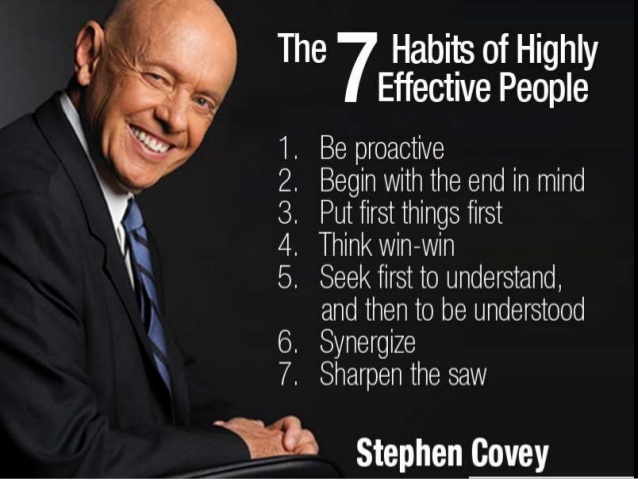
Stephen R. Covey’s book, The 7 Habits of Highly Effective People, first published in 1989, has sold more than 25 million copies worldwide since its first publication. The audio version of this book became the first non-fiction audio-book in U.S. publishing history to sell more than one million copies.
The 7 Habits of Highly Effective People by Stephen R. Covey is a self-improvement book. According to Covey, the way we see the world is entirely based on our own perceptions. In order to change a given situation, we must change ourselves, and in order to change ourselves, we must be able to change our perceptions.
Since we all want to succeed, identifying the habits that can help us on our journey is key to our success. Covey organizes his book in a series of habits, showing them as a progression from dependence through independence on to interdependence.
Covey presents an approach to being effective in attaining goals by aligning oneself to what he calls “true north” principles based on a character ethics that he presents as universal and timeless and in opposition to what he calls the personality ethic. The personality ethic is prevalent in many modern self-help books, but this ethic is faulty and not based on timeless principles.
Covey, in his analysis, separates principles from values. He believes that principles are external natural laws, while values are internal and subjective. Our values govern our behavior, but external principles ultimately determine the consequences.
The 7 Habits of Highly Effective People by Stephen R. Covey is one of the most influential books ever written.
The 7 Habits of Highly Effective People
Habit 1: Be Proactive
Habit 2: Begin with the End in Mind
Habit 3: Put First Things First
Habit 4: Think Win/Win
Habit 5: Seek First to Understand, Then to Be Understood
Habit 6: Synergize
Habit 7: Sharpen the Saw”
My Favorite Top 26 Quotes from The 7 Habits of Highly Effective People
“Most people do not listen with the intent to understand; they listen with the intent to reply.”
― Stephen R. Covey, The 7 Habits of Highly Effective People: Powerful Lessons in Personal Change
“Treat a man as he is and he will remain as he is. Treat a man as he can and should be and he will become as he can and should be.”
― Stephen R. Covey, The 7 Habits of Highly Effective People: Powerful Lessons in Personal Change
“To change ourselves effectively, we first had to change our perceptions.”
― Stephen R. Covey, The 7 Habits of Highly Effective People: Powerful Lessons in Personal Change
“We see the world, not as it is, but as we are──or, as we are conditioned to see it.”
― Stephen R. Covey, The 7 Habits of Highly Effective People: Powerful Lessons in Personal Change
“Two people can see the same thing, disagree, and yet both be right. It’s not logical; it’s psychological.”
― Stephen R. Covey, The 7 Habits of Highly Effective People: Powerful Lessons in Personal Change
“Sow a thought, reap an action; sow an action, reap a habit; sow a habit, reap a character; sow a character, reap a destiny.”
“It’s not what happens to us, but our response to what happens to us that hurts us.”
“If I really want to improve my situation, I can work on the one thing over which I have control – myself.”
“It is one thing to make a mistake, and quite another thing not to admit it. People will forgive mistakes, because mistakes are usually of the mind, mistakes of judgment. But people will not easily forgive the mistakes of the heart, the ill intention, the bad motives, the prideful justifying cover-up of the first mistake.”
“People have character strength but they lack communication skills, and that undoubtedly affects the quality of relationships as well.”
“Happiness, like unhappiness, is a proactive choice.”
“Habit is the intersection of knowledge (what to do), skill (how to do), and desire (want to do).”
“At some time in your life, you probably had someone believe in you when you didn’t believe in yourself.”
“Love is a verb. Love – the feeling – is the fruit of love the verb or our loving actions. So love her. Sacrifice. Listen to her. Empathize. Appreciate. Affirm her.”
“The ability to subordinate an impulse to a value is the essence of the proactive person.”
“Ineffective people live day after day with unused potential.”
“Courage isn’t absence of fear, it is the awareness that something else is important”
“Our behavior is a function of our decisions, not our conditions.”
“As you care less about what people think of you, you will care more about what others think of themselves.”
“Admission of ignorance is often the first step in our education.”
“Albert Einstein observed, “The significant problems we face cannot be solved at the same level of thinking we were at when we created them.”
“People can’t live with change if there’s not a changeless core inside them.”
“How you treat the one reveals how you regard the many, because everyone is ultimately a one.”
“Be patient with yourself. Self-growth is tender; it’s holy ground. There’s no greater investment.”
“The person who doesn’t read is no better off than the person who can’t read.”
“Leadership is communicating others’ worth and potential so clearly that they are inspired to see it in themselves.”
Stephen R. Covey, The 7 Habits of Highly Effective People: Powerful Lessons in Personal Change: Buy on Amazon

